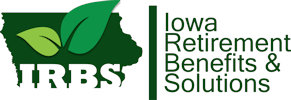I Waited Too Long to Plan for Retirement —Now What?
I Waited Too Long to Plan for Retirement—What Now?
Posted by Jeff Carey
Serving Cedar Rapids, Iowa, and Surrounding Areas.
I Waited Too Long to Plan for Retirement—What Now?
You’re not alone. Many people hit their 50s or even early 60s and realize they haven’t prepared as well as they’d hoped for retirement. Life gets busy—raising families, building careers, navigating unexpected detours—and saving for retirement often takes a back seat.
The good news? While it may be late to start, it’s not too late to make meaningful progress. With the right strategy and a little urgency, you can still build a solid plan for your future.
At Iowa Retirement Benefits & Solutions, we help people just like you get back on track. Here’s a practical roadmap to help you move forward with confidence: 
Meet with a Fiduciary Financial Advisor
Now is the time to get honest with yourself and get some professional help. A trusted fiduciary financial advisor will act in your best interest and help you build a customized, realistic plan based on your current financial situation and goals.
Feeling overwhelmed is normal—working with a professional helps take the pressure off and gives you a clear, step-by-step path forward.
Get Clear on Your Current Financial Picture
You can’t plan for the future without understanding where you stand today. Start by:
-
Calculating your net worth: Add up all your assets (home equity, savings, 401(k), IRA, etc.) and subtract your liabilities (mortgage, credit cards, loans).
-
Tracking your monthly expenses: Knowing what you spend today helps you estimate what you’ll need in retirement.
Maximize Your Income Now
Generating more income today can dramatically improve your retirement outlook:
-
Delay Social Security if possible: Waiting until age 70 can increase your benefits by up to 8% for each year past full retirement age.
-
Continue working: Even part-time work in your 60s can reduce the pressure on your savings and help you delay withdrawals.
-
Leverage your skills: Consider side gigs, freelancing, or consulting to bring in extra income.
Ramp Up Your Savings—Aggressively
You’re in catch-up mode, and the IRS allows for that:
-
Max out retirement accounts: If you’re 50 or older, 2025 contribution limits allow:
-
Up to $30,500 in a 401(k)
-
Up to $8,000 in an IRA (if eligible)
-
-
Automate your contributions: Treat your retirement savings like a monthly bill—non-negotiable.
Reduce Future Expenses
Every dollar you don’t spend is a dollar you don’t have to save. Consider:
-
Downsizing: A smaller home or moving to a lower-cost area could reduce your monthly expenses significantly.
-
Paying off debt: Focus especially on high-interest debt like credit cards or personal loans.
-
Cutting non-essentials: Small lifestyle changes can have a big cumulative impact.
Explore Other Assets 
You may have more resources than you realize:
-
Home equity: Consider tapping into it through downsizing, a reverse mortgage, or renting out a portion of your home.
-
Pensions or annuities: If available, these can offer guaranteed income streams.
-
Health insurance: Don’t overlook planning for Medicare and potential long-term care costs—these can be major retirement expenses.
Your Next Step
Let’s Do This—Together! It’s never too late to take control of your retirement. The key is to act now, make smart decisions, and get the right support.
Let’s chat. The team at Iowa Retirement Benefits & Solutions is here to help you create a realistic plan and regain confidence about your future. Schedule a free and confidential strategy session with us today.
Schedule a free and confidential strategy discussion today!
Email us at info@iowaretirementsolutions.com
Call us at 319-423-3332
Click here to schedule your free consultation.
Investment advisory services are offered through Fusion Capital Management, an SEC registered investment advisor. The firm only transacts business in states where it is properly registered or is excluded or exempted from registration requirements. SEC registration is not an endorsement of the firm by the commission and does not mean that the advisor has attained a specific level of skill or ability. All investment strategies have the potential for profit or loss.




